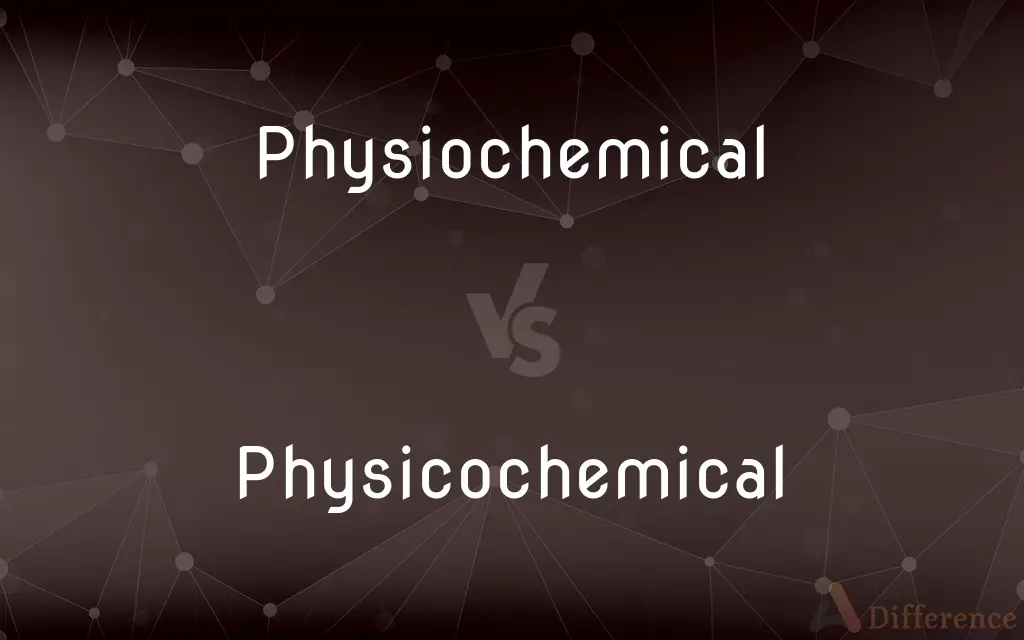Physiochemical vs. Physicochemical — What's the Difference?
Edited by Tayyaba Rehman — By Urooj Arif — Updated on March 25, 2024
Physiochemical refers to biological and chemical processes, while physicochemical emphasizes physical and chemical interactions.

Difference Between Physiochemical and Physicochemical
Table of Contents
ADVERTISEMENT
Key Differences
Physiochemical encompasses the study of chemical processes and their interaction with biological systems, focusing on how chemical reactions occur within living organisms. On the other hand, physicochemical deals with the physical aspects of chemistry, including the principles and methods used to understand the chemical properties and behaviors of substances.
Physiochemical research often aims to understand how chemical substances affect biological tissues and processes, while physicochemical studies might focus on the thermodynamics, kinetics, and phase behavior of chemical reactions without necessarily considering their biological implications.
In the context of drug development, physiochemical studies might investigate how a drug interacts with bodily tissues at the chemical level, whereas physicochemical studies would be more concerned with the drug's solubility, stability, and formulation.
Physiochemical approaches are crucial in fields like biochemistry and pharmacology, where the chemical basis of life processes is the primary interest. In contrast, physicochemical approaches are foundational in chemical engineering and materials science, where understanding the physical and chemical properties of materials is essential.
While physiochemical and physicochemical studies may overlap, particularly in interdisciplinary fields such as environmental science, they differ fundamentally in their primary focus: biological versus physical chemical processes.
ADVERTISEMENT
Comparison Chart
Focus
Biological and chemical processes
Physical and chemical interactions
Primary Concern
Chemical reactions in biological systems
Physical principles of chemical reactions
Applications
Biochemistry, pharmacology
Chemical engineering, materials science
Key Topics
Chemical impact on biological tissues
Solubility, stability, formulation of substances
Interdisciplinary Use
Overlaps with environmental science, toxicology
Overlaps with physics, engineering
Compare with Definitions
Physiochemical
Studying the interaction between chemical substances and biological systems.
Physiochemical research into pollutants assesses their impact on human health.
Physicochemical
Involving the study of chemical systems using physical theory and methods.
Physicochemical analyses determine the melting points of compounds.
Physiochemical
Relating to the chemical processes occurring in living organisms.
The physiochemical study of enzymes reveals how they catalyze biological reactions.
Physicochemical
Concerned with the principles of thermodynamics in chemical reactions.
Physicochemical studies explore how temperature affects reaction rates.
Physiochemical
Concerned with the biochemical effects of drugs on the body.
The physiochemical analysis of a new drug can predict its metabolism and efficacy.
Physicochemical
Examining the phase behavior and stability of chemical mixtures.
The physicochemical properties of emulsions are crucial for food science.
Physiochemical
Involving the study of chemical changes in physiological contexts.
Physiochemical changes in the brain can indicate neurological diseases.
Physicochemical
Pertaining to the physical and chemical properties of substances.
The physicochemical characterization of nanoparticles helps in understanding their behavior.
Physiochemical
Involving the chemical properties and biological activity of biomolecules.
Researchers examine the physiochemical properties of proteins to understand their functions.
Physicochemical
Involving the analysis of solubility and dissolution rates of substances.
Physicochemical testing is vital for pharmaceutical development.
Physiochemical
Of or pertaining to both physiology and chemistry
Physicochemical
Relating to both physical and chemical properties.
Physicochemical
Relating to physical chemistry.
Physicochemical
Dependent on the joint action of both physical and chemical processes.
Physicochemical
Of or pertaining to physical chemistry.
Physicochemical
Involving the principles of both physics and chemistry; dependent on, or produced by, the joint action of physical and chemical agencies.
Physicochemical
Relating to physical chemistry
Common Curiosities
What is physiochemical?
Physiochemical relates to the chemical processes and their interaction with biological systems.
Can physiochemical and physicochemical studies overlap?
Yes, they can overlap in interdisciplinary fields like environmental science, where both biological and physical chemical processes are considered.
How do physiochemical properties impact drug development?
They influence how drugs interact with biological tissues, affecting their efficacy and safety.
Can physiochemical methods be used to study environmental pollution?
Yes, they can assess the chemical impact of pollutants on biological systems and human health.
How do physiochemical studies differ from physicochemical studies?
Physiochemical studies focus on chemical processes in biological contexts, whereas physicochemical studies emphasize the physical aspects of chemical reactions.
What importance do physicochemical principles have in thermodynamics?
They are fundamental in understanding how energy and matter interact in chemical systems.
Why are physiochemical studies important?
They are crucial for understanding how chemicals interact with and affect biological systems, with implications for fields like pharmacology and biochemistry.
How do physiochemical analyses contribute to pharmacology?
They help in understanding the mechanism of action, metabolism, and side effects of drugs.
What does physicochemical mean?
Physicochemical pertains to the physical and chemical properties and interactions of substances.
What role do physicochemical studies play in industry?
They are essential in designing and optimizing chemical processes and products, especially in chemical engineering and materials science.
Can physicochemical properties predict the stability of a chemical compound?
Yes, understanding these properties can help predict how stable a compound will be under various conditions.
What are some applications of physicochemical research?
Applications include developing new materials, understanding chemical stability, and improving drug formulation.
What is the significance of solubility in physicochemical studies?
Solubility is crucial for determining how substances will behave in different environments, affecting everything from drug delivery to environmental pollution.
How does the study of physicochemical properties help in materials science?
It aids in understanding the behavior of materials under different conditions, crucial for developing new materials.
Are physiochemical properties relevant to food science?
Yes, they can influence the biochemical processes affecting food quality and safety.
Share Your Discovery

Previous Comparison
Atheism vs. Theism
Next Comparison
Kawaii vs. MoeAuthor Spotlight
Written by
Urooj ArifUrooj is a skilled content writer at Ask Difference, known for her exceptional ability to simplify complex topics into engaging and informative content. With a passion for research and a flair for clear, concise writing, she consistently delivers articles that resonate with our diverse audience.
Edited by
Tayyaba RehmanTayyaba Rehman is a distinguished writer, currently serving as a primary contributor to askdifference.com. As a researcher in semantics and etymology, Tayyaba's passion for the complexity of languages and their distinctions has found a perfect home on the platform. Tayyaba delves into the intricacies of language, distinguishing between commonly confused words and phrases, thereby providing clarity for readers worldwide.














































